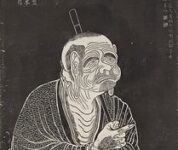Translated from the Classical Chinese by Xiaoqiu Qiu
Thinking About Dao Priest Zhiti
sitting by the green water, I thought about my dear friend.
If only we lived in one place,
we need not miss each other.
The clouds on the water flooded my threshold,
the spring thunder scattered between the branches.
I have a lifetime of endless things,
how can I bear
Twenty-Four Mountain Poems, No. III
good birdie,
sitting on moss, grabbing my nipples
good tea.
I only saw bears
strolling in rows.
In the beginning, the best of poetry
excels that of music;
at the end, the truest truth
emulates that of an infant.
Not that these virtuous spirits of old
Have gone like the wind:
It’s just that few now knows
That they have not.
Five Poems of Spring Wilds
1
Light steps upon light teal, an expanse
of green
Running water alongside chariot, chasing
one another
Carrying a slingshot, little men
from which house?
Aiming it true at the red robe
of a woodpecker.
2
Mountain flowers, rain hits all away
Over the ground, mushy brocades
Looking far for partridge chicks
Yet picked up a lump of fungus.
3
Old bull ploughs the field, in pain
Calf’s eyes look up, as if sob
All things are Heaven’s plan:
The overgrowing weeds huddling up
Like heads.
4
Slanting sunbeams ruin
-ous mound,
Half out of the dirt, a
skull.
Don’t know whose son,
laying
There, spiriting still
Alone.
5
Young bull skinny
Bull girl small
Leaving the bull rope
To play sport
Yet the old man with his hoe
is again too old:
dim dim light smoke
cloaks mulberry grove;
a drunk painter would come,
and without order, sweeps everything
under his brush.
Twenty-Four Mountain Poems, No. XV
Among the hundred cliffs and thousand ravines,
an uneven path,
a drizzle blurs the cypress,
I alone close the door.
The herb boy disappears
into the valley stream,
the flower bee braves
the light smoke at dawn.
Walking idly, let go my mind
in search of gone water,
Sit still, hold up my chin
until the rays of sunset.
I always remember Master Nanquan’s great words:
the students of the Way are rarely
as stuporous and as slow as him.
Twenty-Four Mountain Poems, No. IV
Only in forgetting why
gives splendor to human minds:
green lotus wraps around
sun setting slant.
Deep and secluded
a path leading to a celestial cave:
alone and quiet
no one to fall a flower petal.
Flashing thunder, drifting clouds
Are easy metaphors,
Yet phoenixes or dragons
Need no further comparisons.
Take a look
at the riverside tombstones of heroes:
pine trunks and cypress timbers.
Translator’s Note:
Monk poet Guanxiu (832-912) was a renowned Chan (Zen) Buddhist hermit, wanderer, and artist of many disciplines at a turmoil time in Medieval China. Like many Chan monks before him, he embodied poetry in his religious meditation and vice versa. Unlike those hermits of peaceful times, he wandered the war-torn landscape in the aftermath of one of the most tragic periods in human history—a civil war that decimated up to 80% of the people of the most populous country on earth then (est. 50 million). Reflecting on this drastic social change, he was one of the first to break through the old poetic conventions, as we see him experiment with more vernacular tones, more humanistic perspectives, and more variable musical patterns. Five Poems of Spring Wilds is a good example of how he combined traditional forms of regular line lengths and landscape poetry with a subtle yet chilling twist of imagery of the aftermath of war and how common people had to bear its consequences. No translation has been published in English but I believe he has tremendous relevancy today. Many difficulties lie in translating from Classical Chinese, including its grammar, rhymes, and ambiguity—it is no less than reinventing them in English. I aimed to respect its musical patterns by and large but at times be loyal to its imageries by utilizing more line breaks and spaces.
Also, read five poems by the Italian writer, Antonia Pozzi, translated into English by Amy Newman, and published in The Antonym:



























thoughtful and reading worthy. Thanks